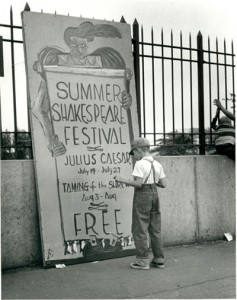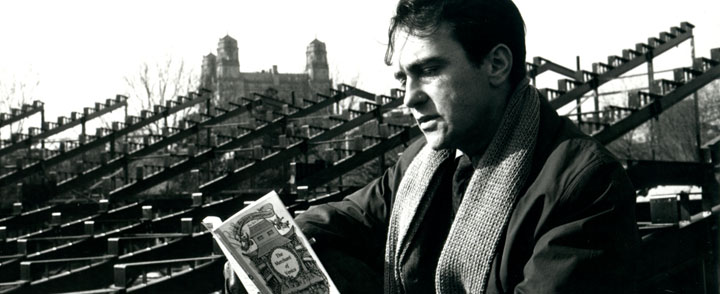Michael Fox, Special to JTNews
The vitality and unpredictability of the streets infuses every minute of “Joe Papp in Five Acts,” Tracie Holder and Karen Thorsen’s bracing portrait of the iconoclastic New York theater producer. At a time when so many people live on and through screens, this documentary provides a veritable gust of real-world, big-city wind.

Wisely shunning a staid narrator in favor of archival audio and TV interviews with the late impresario, augmented with passionate recollections by the likes of Roscoe Lee Browne, Christopher Walken, Mandy Patinkin and playwright David Hare, the filmmakers create a vivid impression of a man whose métier was in-person communication.
Papp elbowed his way into public life in the mid-1950s by creating the New York Shakespeare Festival, which gave free outdoor performances for the masses. He had confidence and style, and friends were under the impression that his father had been English, although he was an active communist.
Papp also had chutzpah and the courage of his convictions, or perhaps it was simply the wisdom he gleaned as an adolescent on the sidewalks of Brooklyn: “If you hit first, you have a tremendous psychological advantage.”
In 1952, Papp cast an unknown George C. Scott as Shylock in “The Merchant of Venice.” Before the production opened, the New York Board of Rabbis decried the play as anti-Semitic. At the height of the controversy, Papp announced that, in fact, he was Jewish, and the son of Eastern European immigrants whose primary (and perhaps only) language was Yiddish.
Growing up during the Depression, Papp had been stung by his father’s inability to find work and his loss of dignity. However, he later confided, “What I experienced more than poverty was anti-Semitism.”

This flashback to Papp’s upbringing is the emotional core of “Joe Papp in Five Acts.” It vividly conjures a specifically Jewish experience of immigration and assimilation, denial and acceptance, that’s slipping out of living memory.
The general lack of opportunity and pervasive injustice left their mark on Papp. Theater, to him, was both a social good and a public necessity. “I don’t just do shows,” he said in a TV interview. “They must have meaning.”
He knew history and understood symbolism, turning the crumbling former home of the Hebrew Immigrant Aid Society into his year-round space, the Public Theater.
Papp fervently believed that theaters were central to the fabric of a city, and should speak to the times. Hence his numerous groundbreaking and risky productions, from “Hair” to David Rabe’s Vietnam-themed “Sticks and Bones” to Larry Kramer’s “The Normal Heart,” which took on AIDS, Mayor Ed Koch, the New York Times and more.
“We’re living in an age of extraordinary passion and struggle,” Papp said in 1985, “and to have something less on the stage than what happens in life is a copout.”
Like many a self-made mogul, Papp could be paranoid and petty, and the doc provides wrenching anecdotes of his break with important artists and collaborators. But he reconciled with most of them before he died of prostate cancer in 1991.
The title refers to the producer’s roller-coaster life, but it can also be interpreted as an exception (or rebuke) to F. Scott Fitzgerald’s maxim, “There are no second acts in American lives.”
Despite all his accomplishments, it’s surprising to discover that Papp was 70 when he died. The film is so steeped in his vigor and passion that we’re left with the impression he was much younger.
